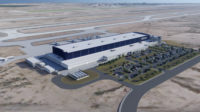Local officials in Arizona expect thousands of construction jobs, permanent jobs and millions of dollars in tax revenues when Lucid Motors’ advanced car-manufacturing facility opens in Casa Grande, midway between Phoenix and Tucson in Pinal County.
The first building of the phased construction, an investment of $300-plus million on a 500-acre site at Peters and Thornton roads, should begin between April and June of this year.
When completed in late 2020 or early 2021, the company will begin production of the electric-powered Lucid Air luxury sedan, says Andrew Hussey, a spokesperson for the Newark, Calif.-based start-up.
Founded in 2007, Lucid expects to spend more than $700 million on its Arizona campus by the mid-2020s, following a recent $1-billion investment from the Public Investment Fund of Saudi Arabia.
“The Lucid Air is a cutting-edge electric vehicle designed, engineered and destined for manufacture entirely in America,” says Peter Rawlinson, Lucid’s CEO and CTO.
With a 400-mile range and 0–60-mph performance in a brisk 2.5 seconds, the mid-size Lucid Air vehicles will sell for $100,000-plus. A lower-priced model in the $65,000 range also is planned.
Site Considerations
Lucid Motors considered 60 sites in 13 states, selecting Casa Grande for business climate, infrastructure, talent, geographic location and the automotive-supply chain in the Arizona-Sonora, Mexico, region, says a spokeswoman for the Phoenix-based Arizona Commerce Authority (ACA), the state’s economic development organization.
“Attracting a high-tech automotive manufacturer like Lucid Motors to Arizona is a testament to the talent, business environment and geographic location our state has to offer innovative companies to help them succeed,” says Arizona Gov. Doug Ducey, who announced Lucid’s plans in Nov. 2016, with a ground-breaking expected the following year.
With site grading now underway, the first 820,000-sq-ft building will include manufacturing, assembly, storage and central utility plant areas and should employ about 745 people, Hussey says.
The construction will be phased, with future buildings incorporating components such as rooftop solar arrays. “We need to quickly build a factory and get it running for lower-volume production starting in late 2020, so the smaller Phase 1 footprint is appropriate,” he explains.
For Phase 2 and beyond, the company will expand construction as higher sales volumes dictate. “This strategy reflects the company’s sensible approach to budget allocation in the capital-intensive industry of EV development and manufacturing: the need to get quickly to production while allocating the bulk of spending on engineering and development and also leaving room to grow as sales and profits increase,” he adds.
Using $29.94 million in bond money, Pinal County acquired the site and is leasing it to Lucid for $1.8 million a year, with a purchase option in five years, Hussey says.
Jobs Producer
Officials expect the project to transform the area into a manufacturing leader, generating approximately 3,230 direct and indirect construction jobs in the next five years, based on an independent 2018 economic analysis commissioned by the city and county.
In addition, for the first two decades, the factory is expected to create 4,800 direct and indirect jobs. During the first 20 years, an estimated $33.5 million in tax revenue is expected for the city and county, and $22.2 million in tax revenues for local schools, the study projects.
“Not only will Lucid bring thousands of good-paying jobs to the area, but it also anchors our efforts to attract additional high-tech businesses to the region and develop a highly skilled workforce for advanced manufacturing,” says Casa Grande Mayor Craig McFarland.
To help train these future employees, the ACA Office of Economic Opportunity has helped start a first-of-its-kind, unified curriculum to meet industry credentialing standards. ACA coordinated with Lucid Motors and other regional manufacturers, the Maricopa Community College District, Central Arizona College in nearby Coolidge and Pima Community College in Tucson to start the program, which is designed to teach the skills needed for high-paying, high-tech, advanced manufacturing jobs.
In addition, the ACA, the city of Casa Grande, Pinal County and Central Arizona College are planning a training facility in the area for advanced-manufacturing businesses. The city has agreed to help pay Lucid for training, including use of the facility, the ACA spokeswoman explains.
Partnering with the Arizona Dept. of Transportation, ACA awarded the city of Casa Grande $500,000 in an Economic Strength Projects Grant for site improvements, including a traffic signal, utility infrastructure and widening of the Peters-Thornton intersection.
Arizona Competes Fund (ACF) and job training grants have been offered, and the company also is eligible for Qualified Facility Tax Credits, an ACA spokeswoman says.
The $5-million (ACF) grants, which promote growth and diversification of business investments in Arizona, are paid incrementally as project milestones are met, she explains. The $1.3-million job training grants reimburse as much as 75% of the approved training costs for eligible employees in rural areas such as Pinal County.
Also, as much as $43.7 million in Qualified Facility Tax Credits may be offered as well as refundable income tax credits for job creation.
“We’re excited to have this significant manufacturing establishment in Casa Grande,” says Sandra Watson, ACA president and CEO. “This project will be transformative for the region, generating thousands of jobs, significant capital investment and attracting a robust supply chain.”





Post a comment to this article
Report Abusive Comment